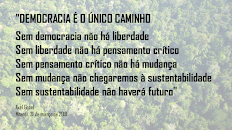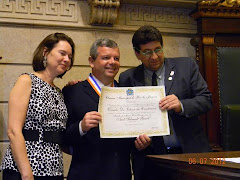Um pronunciamento do diretor executivo do PNUMA - Programa das Nações Unidas para o Meio Ambiente, Achim Steiner, lido na IV Conferência das Nações Unidas sobre Países Menos Desenvolvidos, realizado em Istambul (9 a 13 de maio de 2011), fez o preocupante alerta que o consumo dos recursos naturais triplicará até 2050.
Segundo relatório divulgado, o crescimento da demanda deve-se principalmente ao crescimento populacional e das economias dos seguintes países: China, Índia e Brasil. O dirigente do PNUMA exortou a comunidade internacional a achar meios de evitar o problema. O assunto será um dos mais importantes temas a serem debatidos na Conferência Rio + 20, que será promovido pela ONU no Rio de Janeiro, em junho de 2012.
Axel Grael
Global resource consumption to triple by 2050: UN
UNITED NATIONS — Global consumption of natural resources could almost triple to 140 billion tons a year by 2050 unless nations take drastic steps, the United Nations warned Thursday.
A UN environment panel said the world cannot sustain the tearaway rate of use of minerals, ores and fossil and plant fuels. It called on governments to "decouple" economic growth from natural resource consumption.
With the world population expected to hit 9.3 billion by 2050 and developing nations becoming more prosperous, the report warned "the prospect of much higher resource consumption levels is far beyond what is likely sustainable."
A UN Environment Programme (UNEP) panel said the world is already running out of cheap and quality sources of some essential materials such as oil, copper and gold, which in turn need rising volumes of fuel and water to produce.
It said governments must find ways to do more with less, at a faster rate than economic growth -- the notion of "decoupling".
"We must realize that prosperity and well-being do not depend on consuming ever-greater quantities of resources," said the report.
"Decoupling is not about stopping growth. It's about doing more with less. Global resource consumption is exploding. It's not a trend that is in any way sustainable."
Total world resource use has risen from about six billion tons in 1900 to 49 billion tons in 2000 and has already gone up to an estimated 59 billion tons now.
Currently people in rich nations consume an average of 16 tons of minerals, ores, fossil fuels and biomass -- fuels and other products from plants -- per year. In some wealthy countries the figure rises to 40 tons.
In India, however, the average person only consumes four tons per year, the report said.
The panel said there has to be a major rethink of resource use and "massive investment" in technological, financial and social innovation to at least freeze consumption levels in wealthy countries.
"People believe that environmental 'bads' are the price we must pay for economic 'goods'. However, we cannot and need not continue to act as if this trade-off is inevitable," said UNEP executive director Achim Steiner.
Mark Swilling, a professor at the University of Stellenbosch in South Africa who was one of the authors of the report, said rapid industrialization and the growing population was leading to the resource crisis.
"There is another billion middle-class consumers on the way as a result of rapid industrialization in developing countries," he said.
He said that current rates of efficiency to make goods and services mean that "we are looking at that massive growth to 140 billion tonnes."
With populations in rich countries stabilizing or falling, the main challenge would be in developing countries.
The latest of a series of UNEP reports on economic and environmental sustainability said decoupling has started but is not being activated quickly enough.
Between 1980 and 2002, the resources required for 1,000 dollars of economic output fell from 2.1 tons to 1.6 tons. The increasing move of people from the countryside to cities as helped as this aids campaigns to achieve economies of scale, the report said.
The authors praised Germany and Japan for their move to set goals for energy and resource productivity. It highlighted how South Africa's constitution requires "ecologically sustainable development and the use of natural resources."
China has also set out to build an "ecological civilization" and the report said that China would be a "test case" because of its huge population and growing industrialization.
"The measures that China introduces to reconcile these objectives will be of crucial significance for every other developing country with similar policy intentions," the report said.
A world summit on sustainable development is to be held in Rio de Janeiro in June next year.
Fonte: AFP
-------------------
Clipping do Banco Mundial sobre o assunto:
Global Resource Consumption To Triple By 2050: UN. “Global consumption of natural resources could almost triple to 140 billion tons a year by 2050 unless nations take drastic steps, the UN warned Thursday. A UN Environment Program (UNEP) panel said the world cannot sustain the tearaway rate of use of minerals, ores and fossil and plant fuels. It called on governments to ‘decouple’ economic growth from natural resource consumption….” [Agence France Presse]
BBC adds that “…the projection is based on data on four key resources: minerals, ores, fossil fuels and biomass. Global average annual per capita consumption in 2000 was 8-10 tons, about twice as much as in 1900, the report said. The combination of population growth, continuing high levels of consumption in industrialized countries, and increased demand for material goods - particularly in nations such as China, India and Brazil - saw total resource use grow eight-fold in the 20th Century….” [BBC News]
Reuters writes that “… ‘Decoupling makes sense on all the economic, social and environmental dials,’ UNEP Executive Director Achim Steiner said in a statement. ‘Decoupling is not about stopping growth. It's about doing more with less. Global resource consumption is exploding. It's not a trend that is in any way sustainable,’ added Ernst von Weizsacker, co-chair of the UNEP resource panel….” [Reuters]
Fonte: World Bank Press Review; Press Review for May 13, 2011.























A grave crise ambiental, o esgotamento dos recursos e os desequilíbrios entre o Norte e o Sul, são fatores que obrigam a desenvolver uma nova política energética econsumista. Em curto prazo a prioridade é incrementar a eficiência energética, porém esta tem limites econômicos e termodinâmicos, pelo que, em longo prazo só o desenvolvimento das energias renováveis permitirá resolver as grandes necessidades do futuro. As energias renováveis são a única solução sustentável, e a energia nuclear, de fissão ou fusão, só agravaria a situação e conduzem a um caminho sem saída, de proliferação nuclear e geração de resíduos radiativos.
ResponderExcluirMarcelo M. Amorim